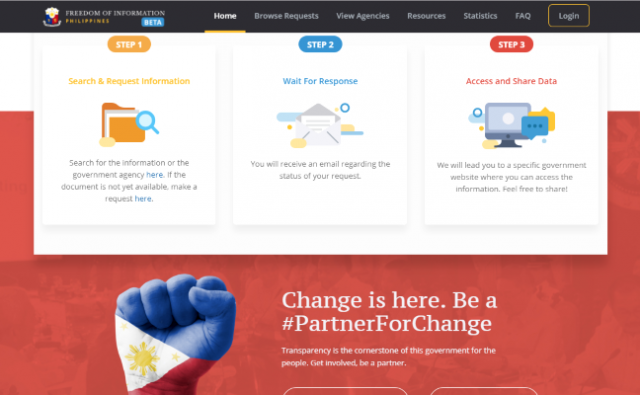How difficult?
Imagine this: you need a list of corporations and partnerships that failed to comply with the rules of the Securities and Exchange Commission (SEC).
So, you personally deliver a request letter to the SEC office at the PICC Complex in Pasay City.
A receiving officer stamps it “received”.
You make six follow-up calls, but no one answers.
You decide to follow up personally 19 days later, and are told by an SEC staff member that he only saw your request on the same day.
That staff member tells you the request needs the chairperson’s approval first.
You ask if there’s another telephone number you can call, but are told that it’s the only one they have.
You make five follow-up calls, but no one answers, again.
Some 13 more days later, you return to the SEC, to deliver a follow-up request letter.
A receiving officer again stamps it “received.”
And, guess what? You still don’t have the information you’re looking for.
This is just one of the experiences of the coalition Right to Know. Right Now! made up of civil society organizations such as Philippine Center for Investigative Journalism, Action for Economic Reforms, CheckMySchool, Bantay Kita, and Focus on the Global South, which are monitoring the government practice of freedom of information (FOI).
This is after President Rodrigo Duterte signed Executive Order No. 02 in July 2016, which aims to ensure people’s access to Executive Branch information, official records, public records, and documents pertaining to official acts, transactions, or decisions, as well as access to government research data used as basis for policy development.
According to the EO, the government office has to respond to the request for information within 15 working days from receipt. But in many cases, the government response exceeded 15 days.
For example, the Department of Budget and Management took 82 days to provide Action for Economic Reforms a list of local government projects and supporting documents so that the organization could monitor the utilization of earmarked funds from the sin tax by local government units.
The Department of Education’s Quezon City Division even required CheckMySchool to obtain a court order to compel the division to release status reports regarding the government’s school-building program, which the DepEd and the Department of Public Works and Highways are responsible for.
According to CheckMySchool, the division reasoned that a private institution had once requested for certain documents from them, and used these documents against them in court. But once CheckMySchool explained that the request was for research and reporting purposes, the division became open to reconsidering their request.
For its part, the Board of Investments denied the request of Action for Economic Reforms for a list of companies that applied for fiscal incentives, and those that were given them. The BOI cited the confidentiality of these records.
In a press conference on Friday, Right to Know. Right Now! co-convenor Joy Chavez said that some of the 20 agencies they monitored preferred requests that were lodged through the government’s eFOI website, while others wanted request letters to have the official request form from the agencies attached.
Coordination among and within agencies needed to be deepend, as not all government personnel knew where to find the information requested for.
Chavez added that there was a need for capacity-building among these personnel. Meanwhile, some of the agencies said they were still trying to sort their information systems out so that data could be more easily accessed.
Chavez also pointed out that many regulatory agencies in charge of disbursing funds and required certain documents to be submitted to them before they made these allowances did not keep this information. This made it difficult for advocates like Right to Know. Right Now! to monitor whether these agencies actually complied with their own issuances.
She stressed, “Information is being requested not so we can shame the agencies for their openness or non-openness. Information are requested because there are certain things that you want to monitor, and certain things that we want to shed light on.”
The interpretation by these agencies of exceptions to FOI was also a problem, she said. The EO reads, “Access to information shall be denied when the information falls under any of the exceptions enshrined in the Constitution, existing law, or jurisprudence.”
Veteran journalist Malou Mangahas, also a co-convenor of Right to Know. Right Now!, was concerned that the Data Privacy Act was being used to “mock” the spirit of the EO. This was because some of the agencies tended to be careful with “so-called sensitive, personal information” under the threat of huge penalties under the Data Privacy Act.
However, she said, the Office of the Ombudsman itself had told the members of the coalition that public officials had “an unwarranted expectation of privacy”.
“If these are not arrested, the right (to information) will be negated altogether, and the EO will simply be a mere scrap of paper,” said Atty. Eirene Aguila, another co-convenor of the coalition.
A private citizen and a public official should have different expectations of privacy, she added.
Particularly with the disclosure of the Statement of Assets, Liabilities, and Net Worth (SALN), Mangahas said, it was Republic Act No. 6713, or the code of conduct and ethical standards for public officials and employees, which should be the reference law, instead of the Data Privacy Act.
The coalition became concerned about this after the Philippine Center for Investigative Journalism found “a very serious case” of SALN redactions being made “en masse” in August.
The Philippine Center for Investigative Journalism obtained the SALNs filed by members of the Duterte Cabinet upon their entry into office in June 2016. There were no redactions. But the multiple redactions in the SALNs surfaced in August.
Based on the Civil Service Commission guidelines on the filing of SALN, the only information that could be redacted was the filer’s home address, Mangahas said.
The coalition was holding a series of meetings with the Presidential Communications Operations Office and the officials in charge of the records in the Office of the President to discuss these issues.






